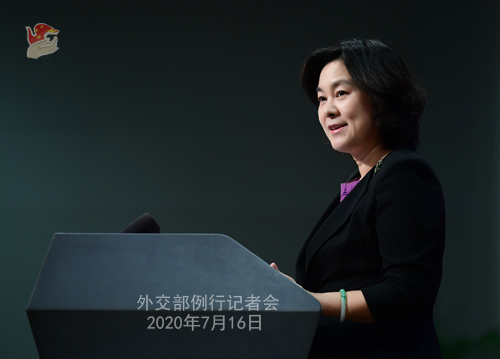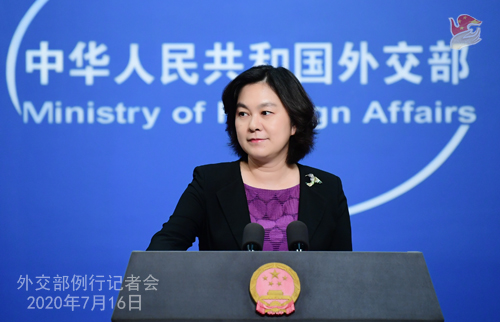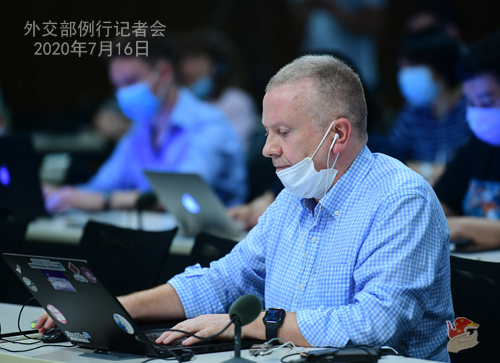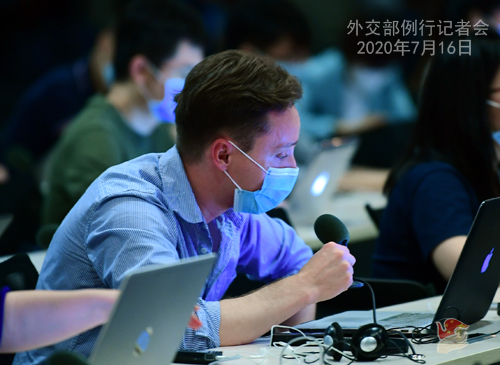| Foreign Ministry Spokesperson Hua Chunying's Regular Press Conference on July 16, 2020 |
| 2020-07-16 22:31 |
|
CCTV: State Councilor and Foreign Minister Wang Yi and Philippine Foreign Affairs Secretary Teodoro Locsin held a meeting via video link, which was described as "open, cordial, and fruitful discussions" in a statement issued by the Philippine foreign ministry. Could you share with us more details? What consensus had been reached? Hua Chunying: On July 14, State Councilor and Foreign Minister Wang Yi held talks with Philippine Foreign Secretary Teodoro Locsin Jr. via video link to exchange in-depth views on China-Philippines relations, anti-epidemic cooperation and the South China Sea. Just as the Philippine side pointed out, the talks were open, cordial, and fruitful. Both sides said they attach high importance to bilateral relations and will continue to implement the consensus between the leaders of the two countries. On the occasion of the 45th anniversary of diplomatic ties, China and the Philippines will further enhance friendship and solidarity, deepen the synergy between the Belt and Road Initiative and the Philippine's "Build, Build, Build" program, advance practical cooperation and new progress in China-Philippines comprehensive cooperative relations and bring more benefits to the two countries and regions. The two sides spoke highly of their mutual assistance during hard times in the joint fight against the epidemic. China and the Philippines will continue to promote anti-epidemic cooperation including vaccine research and development, accelerate the establishment of a fast track for personnel exchanges and promote socio-economic development while maintaining ongoing epidemic prevention efforts. Both sides made clear their opposition to politicizing and attaching a geographical label to the virus and their support to the international community's efforts to tide over difficulties in solidarity. After friendly discussions, both sides believed that maritime disputes do not represent the whole of bilateral relations, and should not and will not derail China-Philippines friendship. China and the Philippines will continue to follow the principle of mutual respect, sincerity and sovereign equality and stay committed to resolving the disputes through friendly bilateral consultations, advancing maritime cooperation, and jointly upholding peace and stability in the South China Sea. CRI: Workers at Los Alamos National Laboratory might have been exposed to plutonium after a nuclear leakage at the site. The US side is seeking to jump-start the lab's ability in plutonium pit production to 30 plutonium pits per year by 2030. What is your comment? Hua Chunying: I have seen relevant reports. The US already possesses the largest nuclear arsenal in the world, and yet it is still advancing modernization of nuclear weapons and development of new-type nuclear weapons to seek absolute strategic security advantage. Its massive investment in rolling out new nuclear weaponry disrupts global strategic stability and poses greater security risks. Experts with the Union of Concerned Scientists already voiced concerns. The US should earnestly fulfill its special and primary responsibilities to nuclear disarmament and promote global strategic security through concrete deeds. Bloomberg: Bloomberg reported that the US President Donald Trump has decided for now against sanctioning a list of high-level Chinese officials. However, the New York Times has separately reported that the administration is considering barring all communist party members from traveling to the US. How does China respond to these? Hua Chunying: I cannot tell whether what you just cited are true. You need to ask the US side for verification. If they are indeed true, I think it's very pathetic. As the strongest power, what impression does it want to leave to the world except for hurling sanctions? We hope the US will refrain from doing more things that disdain the basic norms governing international relations and undermine its reputation, credibility and status as a major country.
The Paper: On July 15, US State Secretary Pompeo said he stood by his remarks describing "the things that are happening on a human rights scale" in China as "the stain of the century". Does China have a comment? Hua Chunying: To be frank, the US, while talking about human rights non-stop, is actually the world's number one human rights abuser, and its allegation on human rights issues in Xinjiang is the lie of the century. Relevant US officials should be ashamed of this, and the American people must be sad having such liars in the administration. The most important criteria on China's human rights situation is whether the Chinese people are satisfied, not the US politicians' comments. Since the People's Republic of China was founded over 70 years ago, the Chinese people, under the leadership of the CPC, have found a development path in line with the country's national realities and achieved remarkable progress. Its vast land of 9.6 million square kilometers is free from war, terror and displacement. The 1.4 billion Chinese people of all 56 ethnic groups live happily together. In the past four decades, per capita income in China increased more than 25 times, with over 850 million people out of poverty, contributing over 70 percent to global poverty reduction. China is also the only country in recent decades that has become the world's second largest economy without resorting to warfare, colonialism or slavery. For more than ten consecutive years, China has contributed to over 30 percent of global GDP growth. This is the greatest human rights endeavor, the best human rights practice, and China's enormous contribution to the global human rights cause. People without bias can all see this fact. If we look at the US, in nearly a century after the country was founded, the US expelled and killed a large number of Indians through the Westward Expansion. The population of native Americans nosedived to 250,000, only one twentieth of the original 5 million. Throughout its 240-plus-year history, only 16 years saw no warfare. Since 2001, it has waged unjustified wars and military operations in Iraq, Libya, Syria, Afghanistan and other countries, spending over $6.4 trillion, causing over 800,000 deaths and displacing tens of millions. Today in the US, African Americans and other minorities are still in dire straits. Mr. Floyd was not the only one who died in the US because he couldn't breathe. There is racial discrimination everywhere and the wealth gap is just shocking. Actually, the US has the most serious income inequality in Western countries. From 1989 to 2018, the bottom 50 percent of households' net wealth growth was essentially zero, a record high in wealth gap in 50 years. In front of such iron-clad facts, we don't know how Mr. Pompeo can be so unabashed when talking about human rights with China? Before opening his mouth, he should ask how the late Mr. Floyd and minorities in the US think of human rights in the US, and how the innocent lives lost in Iraq, Syria and other countries think of the US human rights record. AFP: There have been a lot of US sanctions and Chinese countermeasures recently on Hong Kong, Huawei, Xinjiang. A lot of people are concerned about the trade deal signed between China and the US in January. Is this trade deal still alive, in your opinion? And is China committed to carry out this deal? Hua Chunying: After making arduous efforts, the Chinese and US teams reached a mutually beneficial trade deal based on equality and mutual respect. As we said on multiple occasions, the deal benefits China, the US and the whole world. We surely want to see it faithfully implemented. China always acts on its commitments. We will implement the deal because we put our name on it. That said, some in the US have been spreading hearsay, bullying and oppressing China like crazy, which harms trust and cooperation between the two countries. China must say no to US bullying and biased practices. We are determined in taking measures to safeguard sovereignty, security and development interests. Shenzhen TV: A spokesman for British Prime Minister said on July 15 the reason for the UK's change of position regarding Huawei's participation in the country's 5G network rollout was the impact of the US sanctions which were announced in May. Within the UK, there are also different voices, like the BT's Chief Executive Philip Jansen said the decision clearly had logistical and cost implications for BT. A Vodafone spokesman also said that they're disappointed at this decision which will add delay to the rollout of 5G in the UK and will result in additional costs for the industry. Do you have any comment? Hua Chunying: We noted relevant reports. All this shows that the UK has lost its independence and self-decision, the most cherished thing for a country. The benefits it may gain from this decision cannot make up for its loss. Like I said yesterday, in the past two decades or so, the UK and Huawei had very good cooperation, which serves the interests of the UK. Huawei brought tens of thousands of jobs to the country and made positive contributions to the infrastructure building of the British telecom sector. So, the UK's decision to ban Huawei just compromises its own interests. The British government should heed the rational call at home and make choices that best serve the long-term, fundamental interests of the country.
Beijing Daily: US State Secretary Pompeo recently said repeatedly that excluding Huawei means joining "clean countries". Do you have a comment? Hua Chunying: As the PRISM incident has revealed, the US is really the top empire of hackers in this world. American companies Cisco and Apple admitted years ago that there are security loopholes and backdoors in their equipment. US intelligence has long been running indiscriminate, illegal surveillance programs on foreign governments, businesses and individuals including those of its allies. Even American citizens don't have any secrets. These are open facts. Huawei, however, has been providing services in more than 170 countries, and no country has presented any evidence showing security threats or backdoors in Huawei products. For example, Huawei funded and set up a cyber security testing center in the UK, opens itself to testing by UK experts, and is willing to sign no-backdoor agreement with all countries. Can any other business in any other country do this? Will Apple or Cisco offer to do the same, setting up a security center, opening itself to testing and standing ready to sign no-backdoor agreements? Can any US company match Huawei on such transparency? It makes one laugh to hear Pompeo to accuse Huawei of being not clean. The US always boasts of its strong democracy, freedoms and values, but now it won't allow a foreign private company to live and prosper. Huawei is a successful private company. Its only fault in the eyes of the US is that it's a Chinese company, right? Driven by strong ideological bias, the US went so far as to employ national resources, abuse national security, and use democracy and values as a cover to align its minions to smear, attack and repress the Chinese company. This is the very opposite of being "clean". They are playing real dirty tricks. Bloomberg: Just a follow-up on the Huawei issue. Secretary of State Pompeo said that the US will impose visa restrictions on some employees of Huawei over human rights abuses including against Muslims and other ethnic minorities. Can you comment on that? Hua Chunying: I have made it very clear. The US is actually the world's number one human rights abuser, and its human rights allegation on Xinjiang-related issues is the lie of the century. The US should feel ashamed of having a senior official who tells such monstrous lies on this issue. If Mr. Pompeo has the sincerity, he is welcome to visit Xinjiang, talk with the people living there and also get a grasp on how people in Xinjiang feel about him. Global Times: Pompeo in a recent interview also said that the CPC didn't fulfill its Paris Agreement commitments and broke its promise of not militarizing the South China Sea. Would you like to comment on this? Hua Chunying: I don't want to turn our MFA press conferences into special briefings debunking Pompeo's lies. But since he made these comments, I have to respond to them. I have noted his intensive remarks in the past few days attacking and smearing China. China's position on climate change and the South China Sea is crystal clear. As he's been talking about China violating international law or treaties, I think it might be interesting to see how many treaties and organizations the US has withdrawn from. In 1982, to maintain its maritime hegemony, the United States refused to sign the United Nations Convention on the Law of the Sea (UNCLOS), of which it is still not a party. In 1984, the United States formally withdrew from UNESCO, dissatisfied with the gradual erosion of its cultural control by developing countries. After returning to the organization in 2003, it once again withdrew in 2017 on the so-called ground of saving funds and urging reform. In 1985, the United States refused to recognize the compulsory jurisdiction of the United Nations International Court of Justice (ICJ) after Nicaragua complained that US armed intervention violated its sovereignty. In 1995, the United States withdrew from the United Nations Industrial Development Organization and refused to pay arrears by claiming domestic budgetary constraints. The United States has refused to sign the Kyoto Protocol since 2001, saying it was not in its national interest to meet relevant environmental obligations. In 2001, the United States withdrew from the United Nations World Conference against Racism, Racial Discrimination, Xenophobia and Related Intolerance after failing to prevent discussion of Israeli military action against Palestinians. In 2001, to strengthen its military advantage, the United States formally withdrew from the Anti-Ballistic Missile Treaty signed by the United States and the Soviet Union in 1972. In 2002, the United States withdrew from the Rome Statute of the International Criminal Court, citing unfavorable terms for American soldiers, diplomats and politicians. In 2017, the United States announced its formal withdrawal from the Trans-Pacific Partnership (TPP) because it believed that multilateral trade agreements were not in its best interests and hindered its "America First" policy. In 2017, the US government announced its withdrawal from the Paris Agreement, believing that it hindered the economic development. In 2017, the United States withdrew from negotiations of the United Nations Global Compact on Migration, and cast votes against the UNGCM at the UN General Assembly. In 2018, despite the fact that the IAEA confirmed Iran's fulfillment of its JCPOA commitment and that the United States had no clear evidence to show Iran conducted nuclear tests in breach of the deal, the United States withdrew from the JCPOA, a deal that has been endorsed by the United Nations Security Council, and re-imposed unilateral sanctions against Iran. In 2018, the US announced its withdrawal from the UN Human Rights Council claiming it failed to effectively protect human rights. In 2018, the United States withdrew from the Optional Protocol to the Vienna Convention on Diplomatic Relations, concerning the Compulsory Settlement of Disputes relating to the jurisdiction of the ICJ in order to avoid a Palestinian complaint filed legitimately to the ICJ. In 2019, the United States withdrew from the INF Treaty to develop short- and medium-range missiles without restraint. In 2020, under the pretext of alleged Russian violations of the Open Skies Treaty, the United States announced steps to exit the Treaty. In 2020, the US government, looking for scapegoats for its botched response to COVID-19, announced its withdrawal from the World Health Organization. It should be noted that the United States still owes more than $200 million in assessed contributions. Will it pay it off before exiting? Before accusing other countries of failing to comply with international law and treaties, the US should first reflect upon its own record of exiting at every turn whenever its interests are not served. It exposes its hypocrisy, stark hegemony and double standards. Will the US rejoin these treaties and groupings before attacking China? I hope the US can act like a truly responsible major power and honor international law and treaties it has joined like China and other countries.
ITV: A question about Taiwan. Today the Taiwanese military held drills rehearsing for a Chinese invasion. President Xi has said that unification is his aim. What is the position of the government on that today and is there a timetable for unifying China and Taiwan? Hua Chunying: You should ask the Defense Ministry on questions about military drills. I've seen reports commenting that Taiwan wants to flex its muscle through holding military drills. If Taiwan really thinks that way, then it is hugely overestimating its strength. China is rock-firm in safeguarding its sovereignty and security. Reunification of the People's Republic of China is the inevitable trend. Any force that seeks to separate China needs to be clear-minded about this. The 1.4 billion Chinese people will not allow an inch of the territory to be taken away. China Review News: Considering where the China-US relations are standing now, some analysts say that there is now a unbridgeable ideological chasm between the two countries. A new Cold War is brewing between China and the US. What is your comment? Hua Chunying: China-US relations are closely followed and widely commented by all. This is understandable. State Councilor and Foreign Minister Wang Yi gave a full account of China's take on the current China-US relations and offered some opinions and suggestions in his video speech at the China-US Think Tanks Media Forum several days ago. State Councilor Wang Yi said that some in the US with ideological biases are resorting to all possible means to portray China as an adversary, and even an enemy. They seek relentlessly to frustrate and contain China's development, and to impede interactions between China and the US. The current China policy of the US is based on ill-informed strategic miscalculation, and is fraught with emotions and whims and McCarthyist bigotry. Its suspicion about China, totally uncalled-for, has reached a point of paranoia. It seems as if every Chinese investment is politically driven, every Chinese student is a spy, and every cooperation initiative is a scheme with hidden agenda. If the US lacks confidence, openness and inclusiveness to such an extent, and chooses to conjure up "China Threats" of various kinds, its paranoia may turn into self-fulfilling prophecies at the end of the day. China and the US should not seek to remodel each other. Instead, they must work together to find ways to peaceful coexistence of different systems and civilizations. Every country takes its development path on the basis of its cultural and historic traditions. China's path of socialism with Chinese characteristics suits its own national conditions, and it is the choice of the Chinese people. Facts have proved that this has been the way out of poverty and backwardness for the 1.4 billion Chinese people, and that it has enabled the Chinese nation to make important contribution again to the progress of mankind. International polls have indicated over and again that Chinese people's approval ratings of the Communist Party of China (CPC) and the government rank the highest worldwide. Harvard University's John F. Kennedy School of Government released a report based on their survey in China spanning 13 years. It showed that the Chinese people's overall satisfaction towards the Central Government exceeds 93%. No country, person or external force is in a position to deny the proven right path chosen by the Chinese people. China has never provoked the United States and has no intention of challenging, replacing or confronting on all fronts with the United States. What we care about is to improve the well-being of our people and meet their growing needs for a better life. China's policy towards the US has never changed. We always hope to develop mutually beneficial and win-win China-US relations based on the principle of equality and mutual respect. Of course, this cannot be achieved by China alone. We need the US side to work with us. From the very first day of diplomatic relations with China, the United States knew it was dealing with a socialist country with Chinese characteristics, led by the Communist Party of China. Over the past decades, China and the United States have achieved a lot in cooperation, which has not only promoted our respective development, but also contributed to world peace and settlement of global issues. We hope that the US side will take a more rational and objective view of China and formulate a rational and pragmatic policy towards China. This best serves the fundamental and long-term interests of the Chinese and American people and the expectations of the people across the world. China News Service: Reports say three US soldiers stationed in Japan, who was later found to be infected with COVID-19, concealed their travel histories when entering Japan in violation of the country's quarantine regulations. Defense Minister Kono called it a severe incident, asking the US to handle it seriously. Some commented that the US government won't care about Japan's quarantine as it doesn't even do a good job at home. What's China's view on this? Hua Chunying: It's not the first time that US troops overseas disregarded the laws, regulations and public opinions of their host countries. However, when it comes to COVID-19, a matter concerning people's health and even life and death, their behavior has breached the bottom-line of morality, which is unacceptable to any civil society. APP: According to reports, Pakistan has recently opened five key routes with Afghanistan for bilateral and transit trade. Pakistan has already allowed Afghan traders to use Gwadar port, a key project of China-Pakistan Economic Corridor, for import and export. As a major country in the region and a neighbor of Pakistan and Afghanistan, what does China think about this resumption of trade activity in the region? Hua Chunying: China applauds the endeavors of Pakistan and Afghanistan to overcome difficulties caused by COVID-19 and resume trade and personnel exchange recently. As a neighbor and friend of both countries, China looks forward to improvement of relations between and economic development in Pakistan and Afghanistan, and stands ready to play a constructive role to this end. China supports the extension of CPEC to Afghanistan, which will bring more BRI benefits to the Afghan people. China is also pleased to see the Gwadar port, among other CPEC projects, plays a positive role in this process and stands ready to work together with Pakistan and Afghanistan in this regard. |
| |||||||||||||||
|
|||||||||||||||





